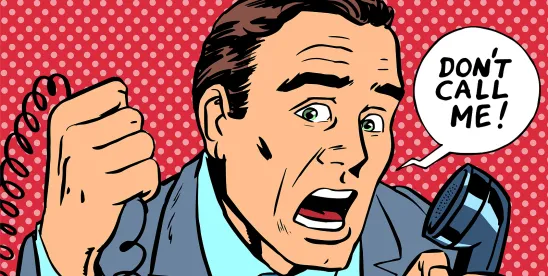So really weird case out this week.
In Lewerentz v. The 1411 State Parkway Condomimium Association, 2024 WL 4063912 (N.D. Ill Sept. 5, 2024) a guy sued a building complex because the emergency elevator call button was set to dial his cell phone.
I’m serious.
See the guy used to work there as the building supervisor and would receive the notifications because it was his job to help rescue people out of the elevator.
When he left his employment he asked the building (allegedly) to remove his number from the elevator but they didn’t. As a result everytime somebody hit the button–which apparently happened dozens of times because kids like to touch things they shouldn’t, etc.–he would receive a prerecorded voice call to his cell phone.
Now this seems to be setting up a really interesting “maker/initiator” argument, but that’s actually not where the case is going.
Because, you see, when the guy complained about the unwanted calls to the building the condo folks allegedly decided it would be funny to push the elevator button a bunch of times themselves to taunt the guy.
Each time the button was pushed some sort of prerecorded notification would allegedly greet him before the live voice of the taunting condo workers so seems like a pretty slam dunk TCPA case.
Nonetheless the Defendant moved to dismiss making a bunch of really dismal argument–all of which the court rejected.
First, Defendant argued Plaintiff needed to specify the exact date and time of the calls at issue. That actually used to be the law (circa 2015) but courts havent required specific pleading like that in over 5 years. So, yeah, rejected.
Next, Defendant argued the allegations of prerecorded call usage was no sufficient but the court found allegations of a “robotic sounding” voice was sufficient.
Perhaps worst of all the Defendant argued the calls were for emergency purposes– but rather obviously calls allegedly made to taunt a former employee are not “emergency” calls so that argument went nowhere.
So it looks like the Defendant is sailing toward a big loss–which, if the facts alleged are true, it richly deserves–and then all of a sudden the court throws out the curviest of balls:
But in an age where individuals acting innocently and telemarketers acting illegally can each use AI technology to generate calls with artificial or prerecorded voices, the overly simplistic interpretation of the TCPA that Plaintiff pushes here paints with too broad of a brush. Recently, the Federal Communications Commission (FCC) issued a declaratory ruling affirming “the TCPA’s restrictions on the use of ‘artificial or prerecorded’ voice encompass current [artificial intelligence] technologies that resemble human voices and/or generate call content using a prerecorded voice.” In the Matter of Implications of Artificial Intelligence Technologies on Protecting Consumers from Unwanted Robocalls and Robotexts, CG Docket No. 23-362, Declaratory Ruling, FCC 24-17 (rel. Feb. 8, 2024). A few weeks ago, the FCC released a notice of proposed rulemaking and notice of inquiry seeking public comment on ways to address potential harms associated with AI initiated robocalls while supporting beneficial uses of the technology that improve telephone network access for consumers with disabilities. See https://www.fcc.gov/document/fccproposes-first-ai-generated-robocall-robotext rules-0 (last visited on 9/3/2024). The point is that not every call made without consent to a cell phone using an artificial or prerecorded voice runs afoul of the TCPA
Ummmm.
Hmmmmm.
So here’s the thing…
literally every call made without consent to a cell phone using an artificial or prerecorded voice runs afoul of the TCPA.
The calls alleged in this case definitely constituted a TCPA violation. The words of the statute were violated. No way around it.
And I am a defense attorney. But the law is the law.
The Court goes on to chide the defendant about its ridiculous conduct but concludes its analysis finding: nothing about the scenario described by Plaintiff here seems to implicate the purpose or intent of the TCPA, which is to curb the “unrestricted telemarketing” that “can be an intrusive invasion of privacy.”
So, at bottom, the Lewerentz court concludes the TCPA only applies to marketing calls.
I have to tell you, this is the first decision to hold that in many many years and the vast majority of courts conclude the TCPA’s restrictions apply universally (although the required level of consent differs based upon whether the call is marketing or not.) So definitely not one you want to base your compliance regime around. Still very very interesting little case here.




 />i
/>i

